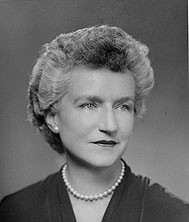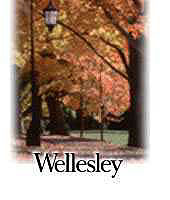 |
From
Wellesley Magazine In Memoriam Elisabeth Luce Moore ’24 1903—2002 |
 |
Elisabeth Luce Moore ’24–educator, philanthropist, volunteer, and former Wellesley trustee–died on Feb. 9.
Beth (as she was affectionately known at Wellesley) was born in Teng Chou, in China’s Shandong Province, of missionary parents working to establish a Christian college. Her roots in Asia were to determine many of the causes she so ably assisted and the interests she maintained throughout her life.
After marrying New York attorney Maurice Moore in 1926, Beth spent several years working as a writer for Time and Fortune, the then-fledgling publications that her brother, Henry R. Luce, founded. She continued to write book reviews and magazine articles for most of her life.
Beth had two sons and became extensively involved in philanthropic work starting in the 1930s. She championed both the national and international YWCA, which, she once wrote, was responsible for improved conditions for "thousands of women in factories and offices, in big cities and little villages, in many parts of the world." During World War II, she was chairman of the National USO Council, traveling throughout the United States to develop USO volunteer groups. She later was a member of the advisory committee to the Marshall Plan.
Education and Asia were focal points for Beth’s work. She served as chair of the board of trustees of the State University of New York for a decade, as president of the United Board for Christian Higher Education in Asia, and as chairman of the Institute of International Education. Beth was a trustee at both the Asia Foundation and the China Institute and once remarked dryly about her work for the latter: "I raised money, raised issues, and when it was important, raised hell. I wouldn’t be in it at all if I didn’t think that Chinese-American relations were very important. We need a core of people who understand Chinese culture in all of its many aspects and can communicate that knowledge."
Beth’s longtime friend Emiko Ishiguro Nishino ’45 points to the great loyalty Beth expressed to her alma mater, in addition to all of her other interests: "She would always say, ‘I will remember Wellesley til my dying day.’" And she did, in many ways.
In 1940, knowing that Wellesley had adopted China’s Yenching University as a sister school in 1919, Beth and another alumna spearheaded a fund drive to support Wellesley teaching fellows at Yenching. Over the years, she and classmates supported the fund. Additionally, in 1999, at the time of Beth’s 75th reunion, the Henry Luce Foundation gave $2 million to support teaching fellowships and other internships throughout Asia. Today, Wellesley graduates teach English every year at Chung Chi College in Hong Kong and Ginling College in Nanjing, part of Beth’s legacy.
Beth also established the Elisabeth Luce Moore ’24 Professorship in Christian Studies–Professor Roger Johnson was the first recipient of the chair–and the Emmavail Luce Severinghaus ’22 Memorial Fund (in honor of her sister), to support alumnae involved in religious endeavors. The Wellesley Centers for Women also benefited her generosity; the fund she established there underwrites the work of outstanding Asian professors.
Beth received both the Alumnae Achievement Award, in 1970, and, five years later, one of only 33 honorary degrees that Wellesley has given in its entire history. The degree citation summed up what she gave to so many causes and institutions: "With perception, commitment, and a rare blend of efficiency and compassion, you have made outstanding contributions to education, international understanding, and the training of women leaders throughout the world."
Beth is survived by her son Michael and many nieces and nephews.